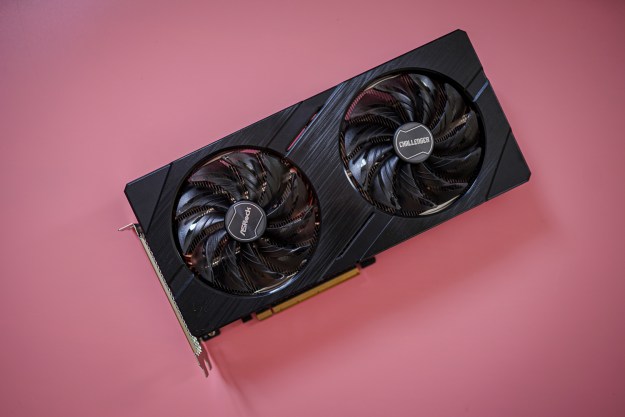Intel’s Arc Alchemist Xe-HPG discrete graphics card was just spotted in a leaked benchmark and has shown performance slightly above Nvidia’s RTX 3070 Ti.
The benchmark gives us more insight into the performance and the specifications of Intel’s upcoming gaming GPU.
Link
3070 Tihttps://t.co/fuBsKVId10
XE 512 @ 2.1 GHzhttps://t.co/xaJVkPDH8n https://t.co/yaLSHkogpn
— APISAK (@TUM_APISAK) January 21, 2022
As reported by TUM_APISAK on Twitter, the benchmark comes from SiSoftware and features a lot of information about the card. Intel is releasing both desktop and laptop versions of the Arc Alchemist, but the one shown in this benchmark is a desktop GPU paired with an unspecified 8th-generation Intel Coffee Lake-S processor.
This iteration of the Intel Arc Alchemist card was always expected to keep up with Nvidia’s RTX 3070 or RTX 3070 Ti, but in this leaked benchmark, it actually outperformed the 3070 Ti by a small margin. In SiSoftware’s test, the card achieved a general-purpose processing score of 9,017.52Mpix/s compared to the 8,369.51Mpix/s of the RTX 3070 Ti. As VideoCardz pointed out, this is a 7.7% win over Nvidia’s GPU for the Arc Alchemist.
A few more tests further show that Arc Alchemist may be on par with the 3070 Ti. The card won in the double-float and quad-float tests, but lost in single-float and half-float. However, the cards vary quite a bit in terms of specifications.

The still-unnamed Arc Alchemist card contains the Intel DG2-512EU chip and has 4,096 CUDA cores. In the benchmark, it was shown with a strange memory size pf 12.8GB. This is most likely just an error, because not only is the number odd, it’s also inconsistent with previous reports. This GPU will most likely feature 16GB of GDDR6 memory across a 256-bit memory bus.
Further information about the card’s specs includes a clock speed of 2.1GHz, although it’s not made clear whether this is the base clock or the boost clock. As previous rumors suggested a clock of up to 2.5GHz, it’s possible that the 2.1GHz is the base speed of the card. It should also feature 225w atts of typical power.
Comparing Arc Alchemist to the RTX 3070 Ti shows a few differences. The RTX 3070 Ti has 6,144 CUDA cores, but only 8GB of GDDR6X memory across a 256-bit memory bus. It also may have a lower clock speed than the Arc Alchemist, with a 1.77GHz boost speed and 1.58GHz base speed. Rumors suggest that Nvidia may be preparing an updated 16GB version of the RTX 3070 Ti to compete with Intel’s new discrete GPU and maintain its place among the best graphics cards on the market.
We will likely see the launch of both the desktop and laptop models of Intel Arc Alchemist sometime in the first quarter of 2022. However, the desktop models may be delayed and there is no telling when exactly they’ll hit the shelves.
Editors' Recommendations
- Intel Battlemage graphics cards: release date speculation, price, specs, and more
- Nvidia RTX 50-series graphics cards: news, release date, price, and more
- You shouldn’t buy these Nvidia GPUs right now
- Intel may be throwing away an important opportunity
- Intel claims up to 268% gaming boost with latest Arc graphics drivers





